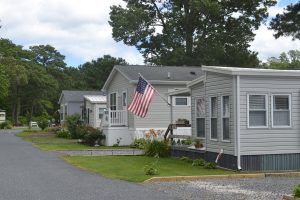
BERLIN — The enforcement plan intended to make sure people aren’t living in White Horse Park full-time is being challenged a week after it was approved by county officials.
Attorney Hugh Cropper, who represents the group of White Horse Park residents fighting the county’s restrictions against year-round occupancy in that community, submitted the first of five appeals to the Worcester County Board of Zoning Appeals Wednesday. The appeals, each of which come on behalf of a year-round resident, are being made on the basis that the county’s plan to fine property owners who fail to abide by the park’s seasonal restrictions comes too late.
“In my opinion the county has waived the right to fine people,” Cropper said. “They’ve known about these year-round occupancies since the 1990s.”
Last Tuesday, the Worcester County Commissioners approved an enforcement plan to ensure residents weren’t staying in White Horse Park year-round. The plan, outlined to property owners in a letter dated Oct.1, involves issuing citations and fines to those who don’t obey the park’s seasonal residency restrictions, which state that between Sept. 30 and April 1 units shall not be occupied for more than 30 consecutive days or an aggregate of 60 days.
“In the event that enforcement becomes necessary, you will be guilty of a civil infraction and may be issued a civil citation each day the violation continues,” the letter reads. “The fine for the first civil infraction shall be $100. Thereafter, fines will escalate each day with a fine of $250 for a second offense, $500 for a third offense and $1,000 each day for a fourth and each subsequent offense.”
The enforcement action comes after the commissioners rejected a text amendment submitted by Cropper on behalf of roughly 50 residents who live in the community full-time. The amendment would have allowed those who have lived in the community since June of 2018 to remain there until they died or moved. While there have reportedly always been some people living in the community full-time, the county didn’t begin efforts to enforce the park’s seasonal restrictions until 2018. That’s when the existing 50 or so full-time residents — most of them senior citizens — hired Cropper to find a way to amend the county code in a way that would allow them to continue living in their homes.
Cropper said this week he was appealing the county’s enforcement decision because it was time-barred. He said the county had been aware that people were living in White Horse Park full-time for decades but was just now proceeding with enforcement.

